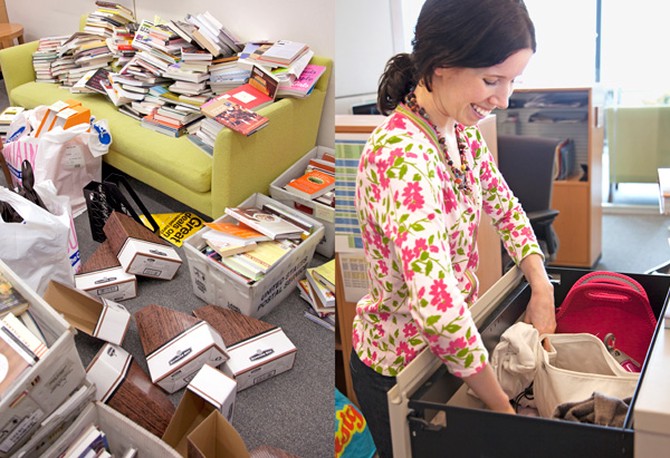Extreme Office Makeover: The O Magazine Edition
Master organizer Peter Walsh takes on the tsunami of books, gifts, food, and—yes—Betamax tapes threatening to engulf O magazine.
By Meredith Bryan
"A Purgatory of Stuff"
In some ways, O is like any office. We have our neatniks, like copy director Stephanie Makrias, whose cabinets are bare save for "terrorism sneakers" she'll use to sprint out of Manhattan in a pinch, and our pack rats, like assistant managing editor Ryan Purdy, who rarely meets a free book he doesn't wish to stash at his desk, er, read. But there is one problem at O that transcends any individual: our office giveaway table. Located treacherously close to the coffee machine, this bounty of self-help tomes, olive oils, doggie outfits, BPA-free water bottles, biscotti, shapewear, plastic martini glasses, flip-flops, and organic cleaning products is replenished daily with items left over from photo shoots or sent by helpful publicists. Most of us graze constantly on these freebies, vaguely intending to take them home—a set of Tupperware, maybe an orange pen we featured in "The O List." But the stuff we don't want, we feel bad throwing away. So it piles up until we have a situation not unlike the one outside editor at large Gayle King's office, where an accumulation of granola bars, decorative pillows, self-published memoirs, and gifts from readers—homemade coffee cakes; framed charcoal sketches of Oprah; rag, felt, and yarn dolls in Oprah's likeness—threaten at any moment to bury her assistant.
The prevailing office attitude toward all this clutter can best be approximated as: "We're too busy working on Very Important Things to notice that no one has seen the top of the communal banks of filing cabinets since 2006."
But to Walsh, a clean, organized office is about more than aesthetics. "It's like approaching a blank canvas every morning," he explains. "It fosters creativity." A messy space, on the other hand, makes you feel overwhelmed before you even start working. It also projects the wrong message, Walsh says: "You want your office to say to writers and advertisers, These people are in command of their area. They know what they're doing." Instead of, These people have a thing for cupcakes and books about the spiritual side of weight loss.
Walsh asks editor in chief Susan Casey—whose office is stocked with Ethiopian coffee beans, coconut water, bottles of wine, plush pink bathrobes, a Christmas gift she never got around to sending to her brother in Canada, and four different umbrellas—why she doesn't just take the excess stuff home, where it won't obstruct her desk and keep her from finding important documents. "I guess the question is, do I want all this stuff in my apartment?" Casey says. "And the answer is probably no. So it's a purgatory of stuff. A purgatory of well-intentioned stuff."
"Decision to Keep"
We begin the way Walsh starts all his projects: with a purge. He says our problem is not the incoming volume of stuff; it's that we delay making decisions about what to do with it. That's why today, everything that serves no essential work purpose will be emptied into the aisles between cubicles to be donated or packed into Dumpsters; items we want to keep that do not help us do our jobs will be placed in bags to be taken home. "You can keep whatever you want," Walsh assures us. "But make a decision to keep. The minute you say, 'I'll deal with it later,' the battle is lost." Soon the hall is filling with cans of Red Bull, mouse pads, mojito mix, an avocado slicer, multiple copies of The Kite Runner. "Keep walking!" Walsh barks when passersby gaze greedily at the castoffs.
The prevailing office attitude toward all this clutter can best be approximated as: "We're too busy working on Very Important Things to notice that no one has seen the top of the communal banks of filing cabinets since 2006."
But to Walsh, a clean, organized office is about more than aesthetics. "It's like approaching a blank canvas every morning," he explains. "It fosters creativity." A messy space, on the other hand, makes you feel overwhelmed before you even start working. It also projects the wrong message, Walsh says: "You want your office to say to writers and advertisers, These people are in command of their area. They know what they're doing." Instead of, These people have a thing for cupcakes and books about the spiritual side of weight loss.
Walsh asks editor in chief Susan Casey—whose office is stocked with Ethiopian coffee beans, coconut water, bottles of wine, plush pink bathrobes, a Christmas gift she never got around to sending to her brother in Canada, and four different umbrellas—why she doesn't just take the excess stuff home, where it won't obstruct her desk and keep her from finding important documents. "I guess the question is, do I want all this stuff in my apartment?" Casey says. "And the answer is probably no. So it's a purgatory of stuff. A purgatory of well-intentioned stuff."
"Decision to Keep"
We begin the way Walsh starts all his projects: with a purge. He says our problem is not the incoming volume of stuff; it's that we delay making decisions about what to do with it. That's why today, everything that serves no essential work purpose will be emptied into the aisles between cubicles to be donated or packed into Dumpsters; items we want to keep that do not help us do our jobs will be placed in bags to be taken home. "You can keep whatever you want," Walsh assures us. "But make a decision to keep. The minute you say, 'I'll deal with it later,' the battle is lost." Soon the hall is filling with cans of Red Bull, mouse pads, mojito mix, an avocado slicer, multiple copies of The Kite Runner. "Keep walking!" Walsh barks when passersby gaze greedily at the castoffs.
Published 08/16/2011


